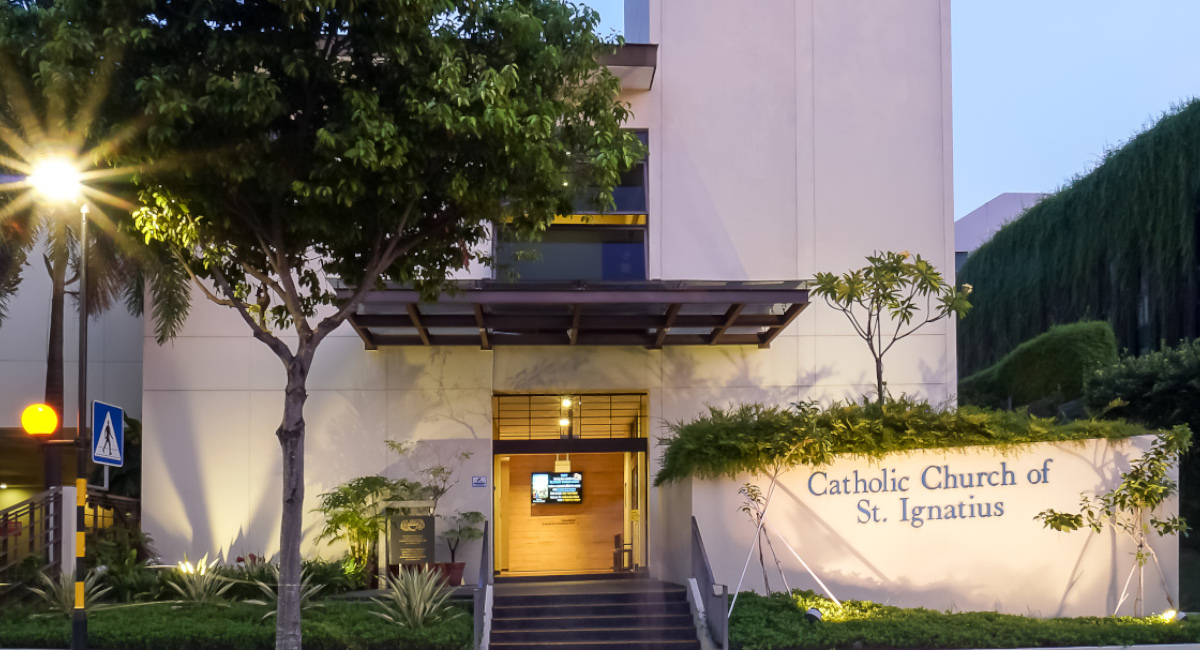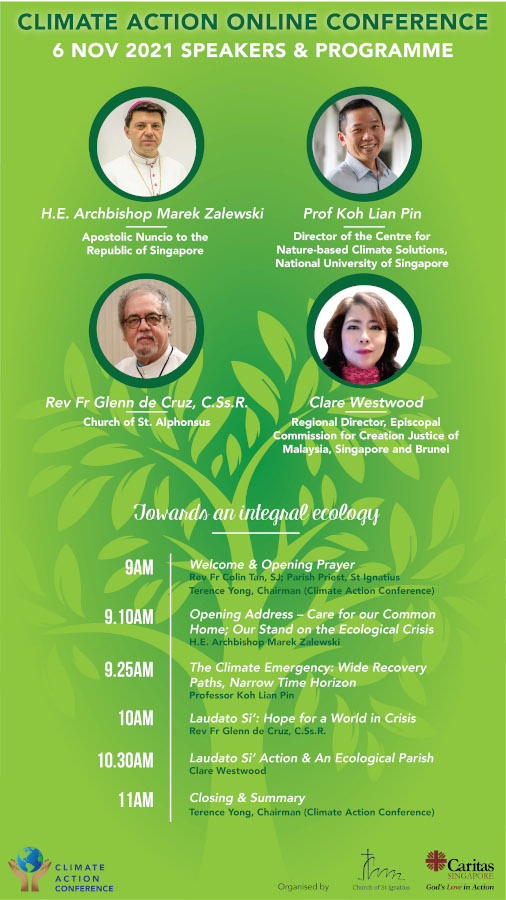 The Jesuit parish of St Ignatius and Caritas Singapore were excited to present the inaugural Climate Action Conference for Catholic parishes in Singapore and the wider community on 6 November via Zoom and YouTube. The conference aims to deepen the awareness of and establish catalysts for action towards Laudato sí goals as announced by Pope Francis.
The Jesuit parish of St Ignatius and Caritas Singapore were excited to present the inaugural Climate Action Conference for Catholic parishes in Singapore and the wider community on 6 November via Zoom and YouTube. The conference aims to deepen the awareness of and establish catalysts for action towards Laudato sí goals as announced by Pope Francis.
Fr Colin Tan SJ, parish priest of St Ignatius and spiritual director of the parish green movement, gave the welcoming speech and prayer. He stressed on three reflective points, which he called the 3As. The first A is “Ask” – each of us can ask ourselves about our own awareness on ecological balance. The second A is “Action” – we are called to action, practise our faith, and at the same time, care for creation and our common home. This action includes how we can make a difference in the world by, among many things, changing our lifestyles to better care for the earth. The third A is “Alert” which is to alert others to climate change. The third A orientates our own awareness in the first A to how we can create ecological awareness in others.
Archbishop Marek Zalewski, Apostolic Nuncio to Singapore, gave the opening address. He quoted many times from Pope Francis’ Laudato sí on integral ecology. He highlighted that we are not only called to economic and ecological conversion, but human and cultural conversion as well. How we interact with the natural world is also how we interact with other human beings.
He urged us to follow our human, moral, and ecological conscience that is closely connected with the principle of justice and the cry of the poor. This is especially important because this call is coupled with our lived faith and the command to follow God’s Word. There is a great need to integrate human knowledge and sciences on ecology with the spiritual aspect of our lives. He further stressed that everything is closely interrelated.
At the end of his address, His Excellency also gave the apostolic blessing to all viewing the conference.
 For the first part of the conference, Professor Koh Lian Pin, Director of the Centre for Nature-Based Climate Solutions, National University of Singapore, gave the climate science behind the current awareness on the environment.
For the first part of the conference, Professor Koh Lian Pin, Director of the Centre for Nature-Based Climate Solutions, National University of Singapore, gave the climate science behind the current awareness on the environment.
Firstly, he said, we do know for a fact that the global climate is getting increasingly warmer. And we know the cause of the issue, that is, the increase of carbon dioxide which is produced by human beings. Furthermore, we know how to address the issue – reduce carbon dioxide emission. It is consoling to know that some governments have concretely taken committed steps to reduce this emission.
Secondly, he talked about what the scientific world is beginning to find out. Numbers don’t lie, but numbers do change over time. What is the scale of our solution versus the scale of our problem? What are the effects of nature-based solutions? Data show that they do work! For example, reforestation helps towards climate change mitigation. But no matter what, there are constraints. People are trying, and these efforts are commendable.
Thirdly and finally, he spoke on what we don’t know but urgently need to know. There are multiple co-benefits of nature-based solutions, for example, biodiversity. Biodiversity is also the building block of a healthy ecosystem. He mentioned “beautiful carbon”, that is, carbon not from a monosystem but from biodiversity. There many healthy carbon ecosystems that are interconnected of which the most commonly known is green – terrestrial forests. The others are blue – mangrove swamps, teal – freshwater swamps and peat swamps, and gold – macroalgae. For him, nature-based solutions are much more beneficial than renewable energy.
The second speaker was Fr Glenn de Cruz, CSsR from the Church of St Alphonsus, on “Hope for a world in crisis”. He put forth the reality of the crisis which we are facing and yet there is hope, especially from scriptural foundation and Christian hope.
He said in a drastic manner: “The cry of the earth and the cry of the poor are interconnected that calls for ecological conversion, which is an ethical imperative of the first order.” From scripture and our Nicene-Constantinople creed, creation has always been part of our faith, but over time theology lost touch with the natural world. However, with our current knowledge of the world, it is of utmost urgency to relook at the connection of our faith with our common home. The spiritual aspect of environmental awareness is now part of it. We need an ecological conversion in order to put right our relationship with God, our neighbour, and creation in an integral way.
In spite of the crises we are currently facing, there is hope. Human beings, while being capable of the worst, are also capable of the best. We have learnt that humans are not in charge of the earth. Humans once thought we were, and that we were separated from the earth, but with our current reality, we are not. We are called to till and keep the earth; tilling means working, and at the same time, we are also called to keep the earth, which means preserving it in a sustainable way.
The third and final speaker was Ms Clare Westwood, Regional Director of the Episcopal Commission for Creation Justice for Malaysia, Singapore, and Brunei. Westwood declared: “We are at the tipping point of our global catastrophe, and we, humans, are the cause.” According to her, there are two options. We can carry on business as usual, which will eventually lead to destruction and death. However, this is not an option looking at the pace the world is going.
The other option is to “Change NOW”, which will bring us life and hope. This change, however, has to integrate creation justice, that is, justice for all life on earth. All humans are meant to live together as one with all living beings. The components of creation justice are justice for mother earth; climate justice; gender justice; social, economic, cultural, political, food, technology, energy justice; intergenerational and intragenerational justice.
In her segment, Westwood proposed some useful action plans in line with Laudato sí at the local level of the Church, specifically, at the parish level for a Laudato Sí parish or Creation Justice parish.
Among her many proposals are to create awareness of the current global crisis; set up a ministry for Creation Justice in the parish with a financial budget for actions; enrol the parish with Laudato sí Action Platform (LSAP); and get parishioners to reflect and commit to action.
Other practical steps are to ecologise all organisations within the parish; infuse ecological spirituality; establish ecology protocol or rules, for example, no use of plastic and styrofoam containers during parish functions. A parish can also carry out resilience assessments and consistently build resilience. Resilience is the capacity to withstand shock and to recover from the shock of ecological devastation. The parish can take care to shrink carbon footprints within its organisation and members. The parish is also commended to collaborate with the followers of other religions in the area of sustainable ecology as everyone plays an important role in it.
There is a second part, sort of a follow up, to this conference which will be held in person on the grounds of St Ignatius’ Church on 20 November. Representatives from different parishes are invited to come together and discuss in an in-depth manner how to build a more ecological parish in Singapore.
The complete conference can be viewed here.
Contributed by Malaysia-Singapore Jesuit Region Communications Office

